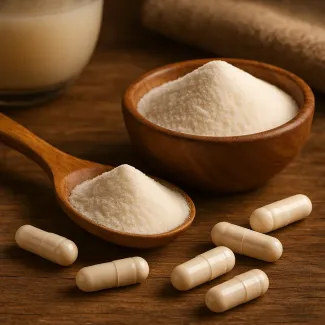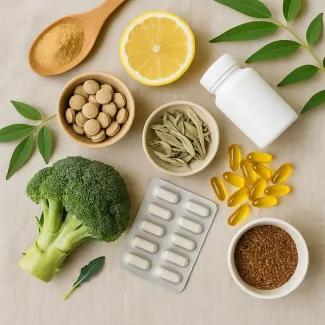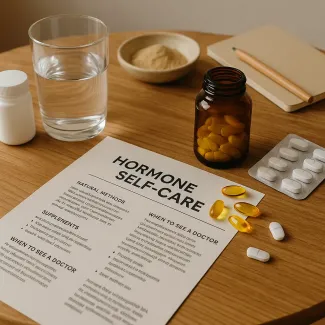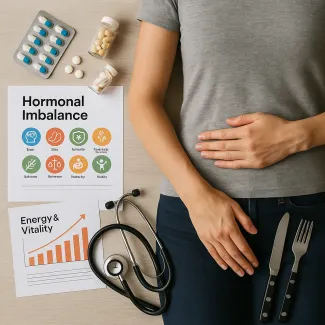
Unlocking collagen’s full potential for long-term vitality and body balance
Discover how collagen contributes to youthful skin, flexible joints and healthy digestion at every age
Collagen is far more than a trendy supplement—it is a foundational component of the human body, making up nearly 30% of all proteins in our system. As we move past our 30s, collagen levels begin to naturally decline, and the effects are hard to miss: fine lines become more visible, joints grow stiffer, and digestive comfort decreases. The search for better skin, stronger joints and a more resilient gut often leads back to one crucial protein—collagen.
Yet not all collagen is equal, and not all individuals require the same support. By understanding how collagen types, sources and absorption pathways differ, you can make smarter decisions about supplements and lifestyle changes. Whether you're navigating your 30s, 40s or 60s, collagen plays a critical role in restoring vitality and protecting long-term wellness.
What collagen really does in your body
There are at least 28 types of collagen, but the majority of benefits for skin, joints and the gut come from Type I, II and III collagen. These types act like structural glue, holding tissues together and maintaining their integrity.
Type I collagen is the most abundant and directly linked to skin elasticity, firmness and hydration. It is also vital for bones and tendons.
Type II collagen is found in cartilage and supports joint comfort and flexibility—something that becomes more important with age and physical activity.
Type III collagen is common in gut tissue, blood vessels and skin, making it indispensable for digestive health and circulation.
When the body lacks adequate collagen, you may notice signs like loose skin, brittle nails, slower recovery from exercise, and even bloating or poor nutrient absorption.
Skin transformation through collagen
Collagen’s role in skin rejuvenation is widely acknowledged, but the way it works goes beyond topical creams and beauty products. The skin’s dermal layer is densely packed with Type I collagen fibers that keep it plump and firm. As these fibers break down due to aging, UV exposure, or lifestyle habits, wrinkles, dryness and sagging become more prominent.
Ingesting collagen peptides—particularly hydrolyzed collagen—can help stimulate the body’s own collagen production. This is often accompanied by increased hyaluronic acid and elastin synthesis, which boosts hydration and skin flexibility.
To maximize skin benefits, collagen should be paired with vitamin C, zinc and biotin, as these nutrients support enzymatic processes that form new collagen in skin cells. Over time, this can improve skin tone, texture and resilience, especially in areas prone to early aging such as around the eyes, neck and mouth.
Relieving joint stiffness and boosting mobility
Joint pain and stiffness often arise from cartilage degradation, which is rich in Type II collagen. As cartilage wears down, bones rub together more easily, causing inflammation, swelling and discomfort. By restoring collagen levels, you can help lubricate joints, improve shock absorption and reduce inflammation.
Hydrolyzed Type II collagen, especially when taken daily, has been shown to reduce joint pain during movement, particularly in the knees, hips and lower back. This is essential for active individuals, athletes, or anyone over 40 noticing changes in physical flexibility.
Collagen supplements can be particularly beneficial when combined with glucosamine, MSM and turmeric, which work synergistically to protect cartilage and manage chronic inflammation. Stretching, low-impact exercise and collagen-rich foods also contribute to long-term joint health.
How collagen influences gut health
Few people associate collagen with digestive comfort, yet it plays an essential role in maintaining a healthy gut lining. Type III collagen supports the structure of the intestinal wall, acting as a protective barrier against inflammation, toxins and irritants that can contribute to leaky gut syndrome.
Collagen contains amino acids like glycine, glutamine and proline, which help repair damaged gut tissue, strengthen mucosal linings and regulate stomach acid production. These effects can reduce symptoms such as bloating, gas, heartburn and irregular bowel movements.
Daily intake of collagen, especially from bone broth or powder-form hydrolysates, can enhance intestinal resilience, making it easier for the body to absorb nutrients and expel waste.
The best dietary sources of collagen
While the body naturally produces collagen, this process slows with age, and modern diets often lack the raw materials required. You can improve your collagen levels through both food and supplementation.
Top food sources include:
- Bone broth – rich in bioavailable collagen and gelatin
- Chicken skin and cartilage – high in Type II collagen
- Fish skin and scales – abundant in Type I and II collagen
- Egg whites – contain proline and glycine, precursors to collagen
- Citrus fruits and berries – support collagen synthesis with vitamin C
Lifestyle factors such as smoking, excess sugar, chronic stress and UV exposure can break down collagen faster. A diet rich in antioxidants, omega-3 fatty acids and protein supports not only collagen production but also its preservation.
When and how to take collagen supplements
Collagen supplements are available in various forms, including powders, capsules, drinks and gummies. The most effective supplements typically contain hydrolyzed collagen peptides, which are easier for the body to absorb and use.
Timing matters—collagen is best taken:
- On an empty stomach for faster absorption
- With vitamin C to promote natural synthesis
- In the morning or post-workout to assist tissue repair
Dosage varies, but 5 to 15 grams daily is commonly used for noticeable benefits. Results usually appear after 4 to 8 weeks of consistent use, depending on age and baseline health.
Can collagen help with aging?
One of collagen’s biggest appeals is its potential to slow visible signs of aging and promote internal rejuvenation. From reducing wrinkle depth to supporting bone density, collagen is central to maintaining a youthful, functional body.
It contributes to:
- Skin density and elasticity
- Joint cushioning and flexibility
- Healthy digestion and gut barrier protection
- Stronger hair and nails
- Improved wound healing and exercise recovery
As estrogen and testosterone decline with age, collagen production also slows. This is especially significant for women in menopause, who may notice rapid skin thinning, brittle bones and changes in gut function. Supporting collagen through diet and supplements can mitigate these effects and restore balance.
Collagen and hormonal health
While collagen is not a hormone, its role in supporting tissues affected by hormonal shifts is often overlooked. Hormonal changes, particularly in women, can affect skin moisture, gut sensitivity and joint inflammation. Collagen can act as a stabilizer, reinforcing areas most impacted by hormonal fluctuations.
This is particularly useful during:
- Pregnancy and postpartum recovery
- Perimenopause and menopause
- Periods of high stress or adrenal fatigue
The glycine in collagen also helps balance cortisol levels, which can indirectly support mood and energy balance—two areas often influenced by hormones.
Synergistic nutrients to boost collagen effects
Taking collagen on its own is helpful, but combining it with cofactors and complementary nutrients amplifies its results. Some of the most beneficial additions include:
- Vitamin C – essential for collagen synthesis
- Zinc and copper – needed for enzymatic functions
- Silica and sulfur – found in herbs and cruciferous vegetables
- Hyaluronic acid – attracts moisture to skin and joints
- Antioxidants (like resveratrol and vitamin E) – protect existing collagen from damage
A diet rich in these components helps create and protect collagen networks, while also reducing oxidative stress, which can rapidly degrade connective tissues.
Collagen for men: what’s different?
While collagen marketing often targets women, men benefit equally—though their needs may differ slightly. Men typically focus on muscle recovery, joint strength and skin resilience due to different lifestyle and hormonal profiles.
Collagen supports:
- Post-workout recovery by aiding tissue repair
- Tendon and ligament resilience in strength training
- Preventing visible signs of aging around the eyes and forehead
- Gut health, especially for men with high-protein or alcohol-heavy diets
Men over 40 should especially consider Type I and II collagen supplements, paired with magnesium and protein-rich foods to support metabolic and structural balance.
Signs you may need more collagen
Collagen deficiency is not always obvious at first, but common signs include:
- Loss of skin elasticity or “crepey” texture
- Joint clicking or reduced range of motion
- Digestive discomfort, especially with certain foods
- Thin, breaking hair or brittle nails
- Delayed wound healing
- Fatigue during exercise or slower muscle recovery
If several of these symptoms appear, increasing collagen intake—through both diet and supplementation—can support faster regeneration and long-term wellness.
Common myths about collagen
There are many misconceptions about collagen, such as:
- “All collagen works the same” – Different types serve different functions
- “You don’t need supplements if you eat well” – Modern diets rarely meet optimal levels
- “Collagen only helps skin” – It impacts muscles, bones, joints, gut and more
- “Collagen is only for women” – Men benefit equally in unique ways
- “Collagen supplements don’t work” – Consistency and proper pairing matter
Understanding these nuances can help you make informed choices and see better results.
Making collagen part of your daily routine
Incorporating collagen into your lifestyle doesn’t have to be complicated. Start with a morning smoothie with collagen peptides, a collagen-rich bone broth for lunch, or capsules with vitamin C before bedtime. Over time, this habit becomes a cornerstone of your wellness practice.
With consistency, you’ll notice improvements in skin texture, joint mobility, digestion and even mood. Collagen is not a magic fix—but when paired with the right habits, it becomes a powerful ally in preserving youth, strength and resilience at every stage of life.





